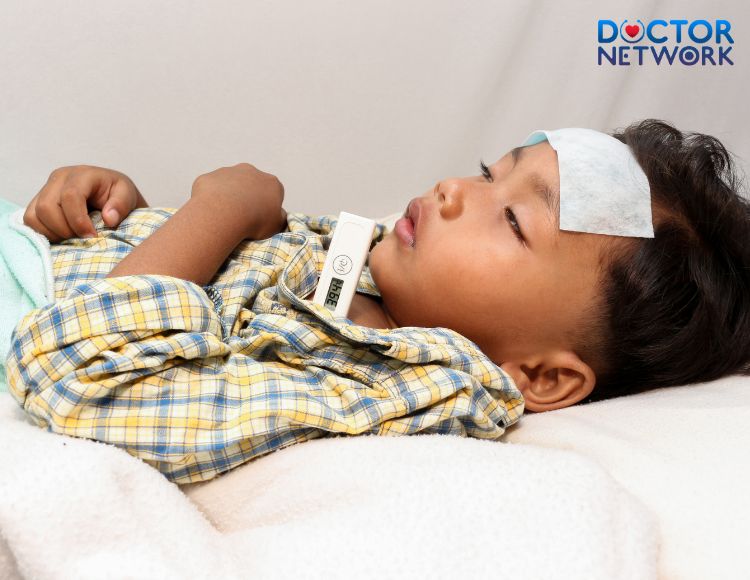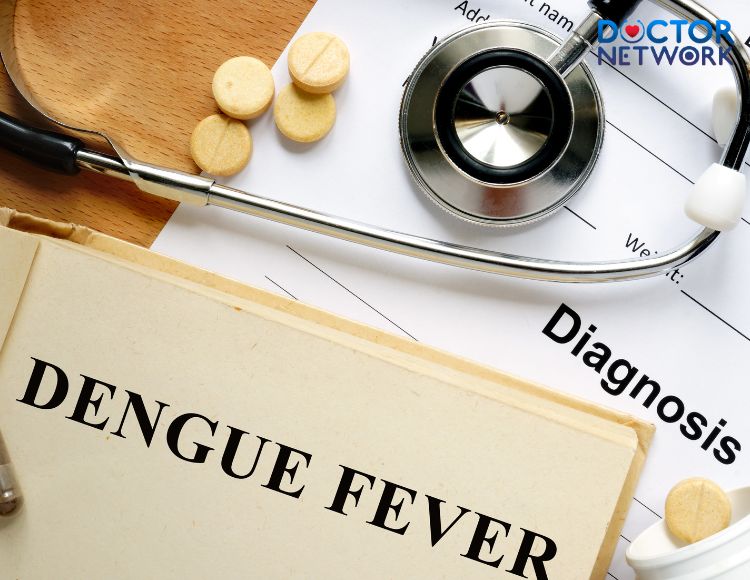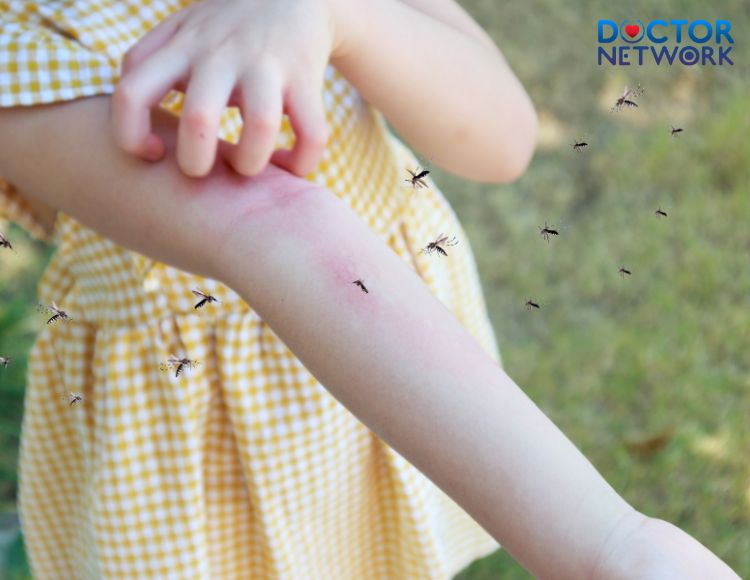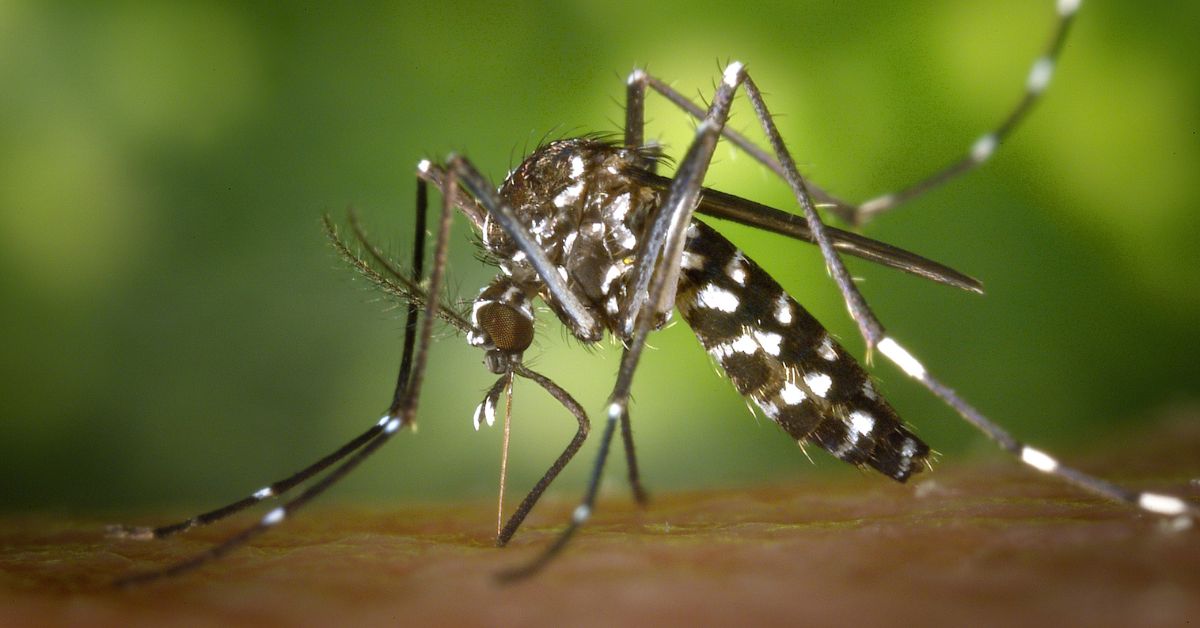Dengue fever, a mosquito-borne viral infection, affects millions worldwide annually. As patients battle this potentially life-threatening disease, recognizing the signs of recovery becomes crucial for both medical professionals and those affected. This article delves into the “signs of dengue fever recovery“, providing essential information for patients, caregivers, and healthcare providers alike.
Understanding Dengue Fever Recovery
What is Dengue Fever?
Dengue fever is a viral infection transmitted by Aedes mosquitoes, primarily Aedes aegypti. This arboviral disease, caused by one of four dengue virus serotypes (DENV-1, DENV-2, DENV-3, DENV-4), can manifest in various forms, from mild to severe. Early detection and appropriate treatment are paramount in managing dengue fever effectively and preventing complications.

Dengue fever is a disease caused by the dengue virus
The Different Stages of Dengue Fever
Dengue fever typically progresses through three distinct phases:
- Febrile Phase (Days 1-3):
- High fever (40°C/104°F)
- Severe headache
- Muscle and joint pain (breakbone fever)
- Nausea and vomiting
- Critical Phase (Days 4-6):
- Sudden drop in fever
- Potential for severe complications
- Risk of dengue hemorrhagic fever (DHF) or dengue shock syndrome (DSS)
- Recovery Phase (Days 7-10):
- Gradual improvement of symptoms
- Return of appetite
- Stabilization of vital signs
The Recovery Process: A Timeline
Dengue fever recovery typically spans 7-10 days, though individual cases may vary. Here’s a general timeline:
During recovery, rest, hydration, and proper nutrition are essential. Patients should focus on replenishing fluids, consuming easily digestible foods, and gradually increasing physical activity as energy levels improve.
Recognizing the Signs of Dengue Fever Recovery
Decreasing Fever and Pain
A clear indicator of dengue fever recovery is the gradual reduction in fever and body aches. The fever typically subsides in one of two ways:
- Gradual decline: Temperature slowly returns to normal over several days.
- Sudden drop: Known as “defervescence,” this marks the transition to the critical phase.
As the fever recedes, patients often experience a significant decrease in muscle pain (myalgia) and joint pain (arthralgia), hallmarks of dengue’s “breakbone fever” moniker.
Improved Appetite and Energy Levels
The return of a normal appetite signals the body’s transition towards recovery. Patients often report:
- Increased desire for food
- Ability to tolerate larger meals
- Reduced nausea and vomiting
Concurrently, energy levels begin to rise. While fatigue may persist for weeks post-infection, patients gradually regain strength and stamina.
Reduction in Skin Rash and Other Symptoms
As recovery progresses, the characteristic dengue rash begins to fade. This maculopapular or petechial rash, often described as “islands of white in a sea of red,” typically resolves within 1-2 weeks. Other symptoms that should show improvement include:
- Headache intensity
- Eye pain (retro-orbital pain)
- Gastrointestinal discomfort
Maintaining good hygiene during this phase is crucial to prevent secondary skin infections.
Normal Blood Count and Platelet Levels
A key clinical indicator of recovery is the normalization of blood parameters. Healthcare providers monitor:
- Platelet count: Should rise above 150,000 per microliter
- White blood cell count: Returns to normal range (4,500-11,000 per microliter)
- Hematocrit levels: Stabilize as plasma leakage resolves
Regular blood tests during recovery help track these improvements and ensure the patient is progressing well.
Important Considerations During Recovery
Potential Complications and Warning Signs
While most patients recover fully, vigilance for potential complications is crucial. Severe forms of dengue, such as dengue hemorrhagic fever (DHF) or dengue shock syndrome (DSS), can develop even as symptoms seem to improve.
Warning signs to monitor include:
- Severe abdominal pain
- Persistent vomiting
- Rapid breathing
- Bleeding gums or nose
- Fatigue or restlessness
- Liver enlargement
- Blood in vomit or stool
While most patients recover fully, vigilance for potential complications is crucial
When to Seek Medical Attention
Patients should seek immediate medical care if they experience:
- Any of the warning signs mentioned above
- Sudden high fever after initial fever subsidence
- Difficulty breathing or chest pain
- Altered mental state or confusion
- Inability to urinate for 4-6 hours
Prompt medical intervention can be life-saving in cases of severe dengue.
Supporting Dengue Fever Recovery
Maintaining a Healthy Lifestyle
A balanced approach to recovery includes:
- Nutrition: Focus on easily digestible, nutrient-rich foods
- Hydration: Consume plenty of fluids, including oral rehydration solutions
- Rest: Allow adequate sleep and avoid overexertion
- Gradual activity increase: Slowly reintroduce physical activities as tolerated
Managing Dengue Fever Symptoms
To alleviate lingering symptoms:
- Use acetaminophen for fever and pain (avoid aspirin and NSAIDs)
- Apply cool compresses for comfort
- Consider natural remedies like papaya leaf extract (under medical supervision)
- Practice gentle stretching exercises to relieve muscle and joint pain
Preventing Dengue Fever
Understanding the Mosquito Life Cycle
Aedes mosquitoes, the primary vectors of dengue virus, have a four-stage life cycle:
- Egg
- Larva
- Pupa
- Adult
These mosquitoes breed in stagnant water, often in man-made containers. Eliminating standing water sources is crucial for preventing mosquito proliferation.
Protecting Yourself from Mosquito Bites
Effective prevention strategies include:
- Using EPA-registered insect repellents (e.g., DEET, Picaridin)
- Wearing long-sleeved shirts and long pants
- Using air conditioning or window/door screens
- Emptying and scrubbing containers that hold water weekly
- Using mosquito nets while sleeping
Public Health Initiatives for Dengue Control
Community-wide efforts play a vital role in dengue prevention:
- Vector control programs: Targeted insecticide spraying and larval source reduction
- Public education campaigns: Raising awareness about dengue prevention
- Surveillance systems: Early detection of outbreaks
- Vaccine development: Ongoing research for effective dengue vaccines

After recovering from the disease, the body has immunity to the type of virus that was infected
By understanding the signs of dengue fever recovery and following proper care guidelines, patients can navigate the recuperation process more effectively. Remember, while these indicators provide valuable insight, always consult with healthcare professionals for personalized medical advice and monitoring during recovery.
5 Frequently Asked Questions About “Signs of Dengue Fever Recovery”
Here are 5 frequently asked questions about “Signs of Dengue Fever Recovery”:
How do I know if I am recovering from dengue fever?
Some signs that you are recovering from dengue fever:
Fever decreases: Fever gradually decreases and disappears completely after 3-7 days.
Symptoms improve: Headache, muscle pain, fatigue gradually decrease.
More appetite: You feel more hungry and enjoy your food.
Better spirit: You feel healthier and more comfortable.
Increased blood platelets: Your doctor will monitor and notify you when your blood platelets increase again.
Note: Even though the symptoms have decreased, you still need to follow the treatment instructions and return for follow-up visits as scheduled by your doctor.
How long does it take for dengue fever to completely go away?
Recovery time after dengue fever is usually 7-10 days, depending on many factors:
Constitution: People with good resistance will recover faster.
Severity: Severe dengue fever requires longer recovery time.
Complications: The appearance of complications will prolong recovery time.
Care: A reasonable diet and rest will help you recover faster.
What can I eat and drink to recover from dengue fever quickly?
Diet plays an important role in the recovery process after dengue fever. You should:
Drink plenty of water: Rehydrate the body, especially with oresol, coconut water, fruit juice.
Eat easily digestible foods: Porridge, soup, chicken soup, …
Supplement vitamins and minerals: Eat lots of green vegetables, fresh fruits, lean meat, …
Avoid spicy, greasy foods: Causes indigestion and affects the digestive system.
After recovering from dengue fever, do I need to abstain from anything?
After recovering from the disease, you should still pay attention to:
Reasonable rest: Avoid strenuous exercise, overwork.
Drink enough water: Maintain the habit of drinking plenty of water every day.
Eat a nutritious diet: Support the body to fully recover.
Re-examination according to the appointment: Ensure stable health.
Can I get dengue fever again?
Immunity after recovery only protects you from the type of dengue virus you have contracted. You are still at risk of getting dengue fever again with the remaining 3 types of virus. Therefore, you need to:
Continue to take measures to prevent mosquito bites.
Keep your living environment clean, eliminate mosquito breeding sites.
Scientific evidence for “signs of dengue fever recovery”
Here are some scientific evidences for “signs of dengue fever recovery”:
According to the World Health Organization (WHO), fever usually subsides after 3-7 days from the onset of the disease in dengue patients.
A study published in the journal PLOS One in 2014 showed that when fever subsides and symptoms such as headache, muscle pain, and nausea are reduced, patients tend to recover well.
According to a study published in The Lancet in 2008, an increase in the number of blood platelets after a sharp decrease is a sign that the patient is entering the recovery phase.
A study by the Vietnamese Ministry of Health in 2012 showed that stable blood pressure and pulse are signs that the disease is improving.
Recognizing the signs of dengue fever recovery helps patients and caregivers take appropriate measures. The recovery process requires patience and careful care. Preventing reinfection not only protects you but also helps prevent the spread of the disease in the community. Always be vigilant and proactive in preventing dengue fever, for your own health and the health of those around you.
References:
https://careplusvn.com/en/dengue-fever-is-it-cured-when-the-fever-is-gone
https://www.vinmec.com/eng/article/signs-that-the-baby-is-about-to-recover-from-dengue-fever-en
https://www.healthxchange.sg/women/health-scares-outbreaks/dengue-fever-how-to-recover-fast
Kiểm Duyệt Nội Dung
More than 10 years of marketing communications experience in the medical and health field.
Successfully deployed marketing communication activities, content development and social networking channels for hospital partners, clinics, doctors and medical professionals across the country.
More than 6 years of experience in organizing and producing leading prestigious medical programs in Vietnam, in collaboration with Ho Chi Minh City Television (HTV). Typical programs include Nhật Ký Blouse Trắng, Bác Sĩ Nói Gì, Alo Bác Sĩ Nghe, Nhật Ký Hạnh Phúc, Vui Khỏe Cùng Con, Bác Sỹ Mẹ, v.v.
Comprehensive cooperation with hundreds of hospitals and clinics, thousands of doctors and medical experts to join hands in building a medical content and service platform on the Doctor Network application.



























